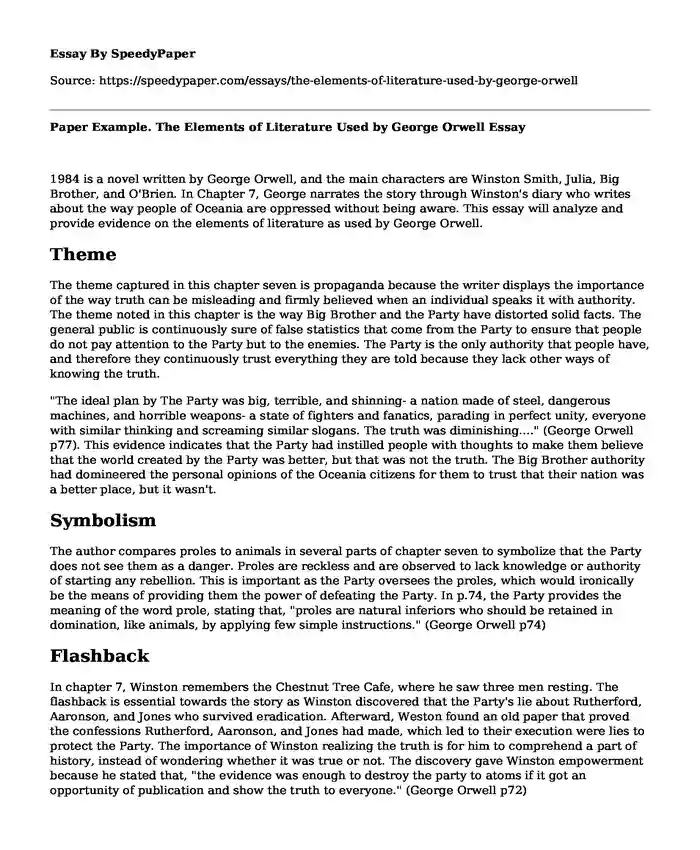
| Type of paper: | Essay |
| Categories: | 1984 George Orwell Symbolism |
| Pages: | 3 |
| Wordcount: | 698 words |
1984 is a novel written by George Orwell, and the main characters are Winston Smith, Julia, Big Brother, and O'Brien. In Chapter 7, George narrates the story through Winston's diary who writes about the way people of Oceania are oppressed without being aware. This essay will analyze and provide evidence on the elements of literature as used by George Orwell.
Theme
The theme captured in this chapter seven is propaganda because the writer displays the importance of the way truth can be misleading and firmly believed when an individual speaks it with authority. The theme noted in this chapter is the way Big Brother and the Party have distorted solid facts. The general public is continuously sure of false statistics that come from the Party to ensure that people do not pay attention to the Party but to the enemies. The Party is the only authority that people have, and therefore they continuously trust everything they are told because they lack other ways of knowing the truth.
"The ideal plan by The Party was big, terrible, and shinning- a nation made of steel, dangerous machines, and horrible weapons- a state of fighters and fanatics, parading in perfect unity, everyone with similar thinking and screaming similar slogans. The truth was diminishing...." (George Orwell p77). This evidence indicates that the Party had instilled people with thoughts to make them believe that the world created by the Party was better, but that was not the truth. The Big Brother authority had domineered the personal opinions of the Oceania citizens for them to trust that their nation was a better place, but it wasn't.
Symbolism
The author compares proles to animals in several parts of chapter seven to symbolize that the Party does not see them as a danger. Proles are reckless and are observed to lack knowledge or authority of starting any rebellion. This is important as the Party oversees the proles, which would ironically be the means of providing them the power of defeating the Party. In p.74, the Party provides the meaning of the word prole, stating that, "proles are natural inferiors who should be retained in domination, like animals, by applying few simple instructions." (George Orwell p74)
Flashback
In chapter 7, Winston remembers the Chestnut Tree Cafe, where he saw three men resting. The flashback is essential towards the story as Winston discovered that the Party's lie about Rutherford, Aaronson, and Jones who survived eradication. Afterward, Weston found an old paper that proved the confessions Rutherford, Aaronson, and Jones had made, which led to their execution were lies to protect the Party. The importance of Winston realizing the truth is for him to comprehend a part of history, instead of wondering whether it was true or not. The discovery gave Winston empowerment because he stated that, "the evidence was enough to destroy the party to atoms if it got an opportunity of publication and show the truth to everyone." (George Orwell p72)
Foreshadow/Rising Action
The starting of Chapter 7 presents a kind of rising action and also characterization. Winston is searching for methods of overthrowing the Party. He does this with desperation and motivation as compared to the 1st chapter of the book when he was full of fear concerning crime thoughts, and he could not dare think about them. The chapter foreshadows about the proles' ability and the things they can do in the future chapters. Winston wrote that "if hope was present, it was with the proles." (George Orwell p73)
Lesson from this Chapter
The society layout in this chapter reflects the societal structure of a country before the revolution. The division of power is similar to the one stated in the 1984 novel. The clergy's authority is the same as the monarchial king represented by the Big Brother's dictatorship. The second class system is built of people who follow the orders made by the upper-class individuals. The third class is the proles in the story, and they represent the most significant part of the population. The third class has no say in the factors affecting their lives. They only follow the rules made by the authority.
Work Cited
"1984." George Orwell - 1984 - Part 1, Chapter 7, http://www.george-orwell.org/1984/6.html.
Cite this page
Paper Example. The Elements of Literature Used by George Orwell. (2023, Feb 15). Retrieved from https://speedypaper.com/essays/the-elements-of-literature-used-by-george-orwell
Request Removal
If you are the original author of this essay and no longer wish to have it published on the SpeedyPaper website, please click below to request its removal:
- Business Essay Example with an Intraprenuership Plan for Coca-Cola Company
- Hospital Assessment Essay Example
- Free Paper for You on Using Tact and Diplomacy in Treatment Groups
- Free Essay Describing the Conflict and Negotiations Example
- Free Essay: The Quality of Service Delivery to Patients
- Essay Example: Hospitality Industry Career Opportunities
- Free Essay Sample: Job Growth
Popular categories




